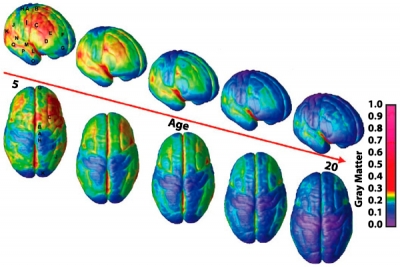
As hormone levels go up and down, teenagers can experience emotional highs and lows. Adolescence is a time of great upheaval in the brain, too. It is clearing out millions of neural connections that are no longer needed, forming more efficient networks of nerve pathways, and learning to control rapidly growing limbs and muscles. These factors affect thinking and behaviour, and many teenagers often feel clumsy and moody.
Grey to white
The brain is rewired dramatically during puberty, as these scans show. The red areas show the highest volume of grey matter, while blue and purple areas have lower grey matter volume. As unused brain circuits are pruned away, grey matter is reduced. With less grey matter and more white matter, the brain does not learn new skills so quickly, but it is much better at using the skills it already knows.
Raging hormones
As well as affecting the physical make-up of the brain, hormones alter the behaviour of teenagers.
Sleep patterns
Teenagers need more sleep than children or adults. A hormone called melatonin helps people fall asleep. This is released later in the evening for teenagers which is why they struggle to get up in the morning.
Taking risks
Teens sometimes do risky things without thinking of the consequences. They lack judgement because although the thrill-seeking part of the brain is fully formed, the decision-making area is still maturing.
Moodiness
Alterations in hormone levels, together with changes in parts of the brain that deal with emotions, can cause teenage mood swings and impulsive or aggressive behaviour.
Clumsiness
Teens may feel clumsy and uncoordinated at times. This happens because their body shapes are changing, and the brain is struggling to make new neuron connections fast enough to keep pace.
Picture Credit : Google

